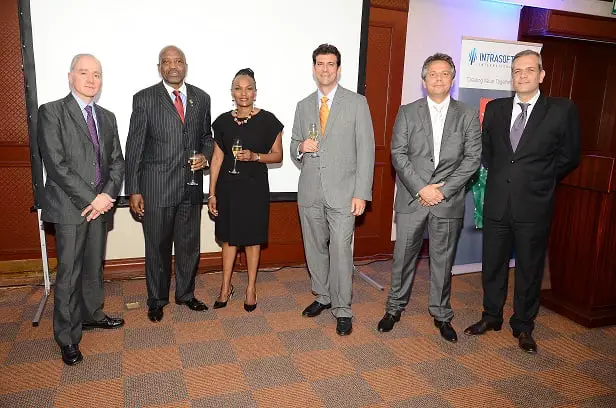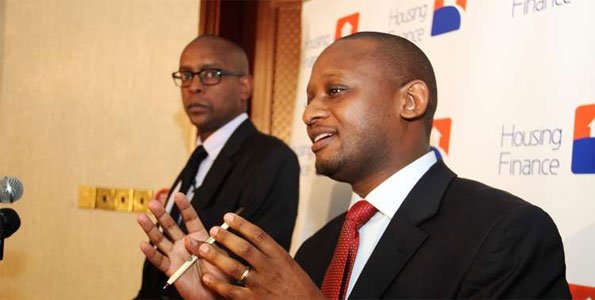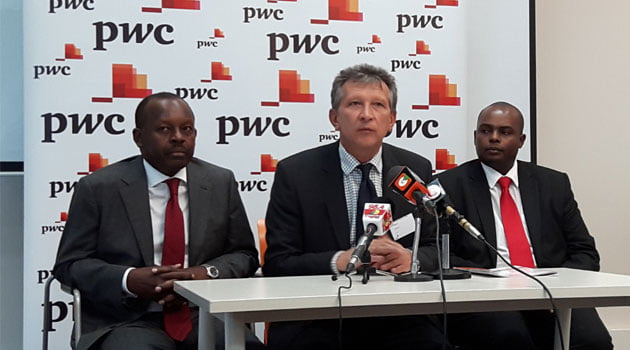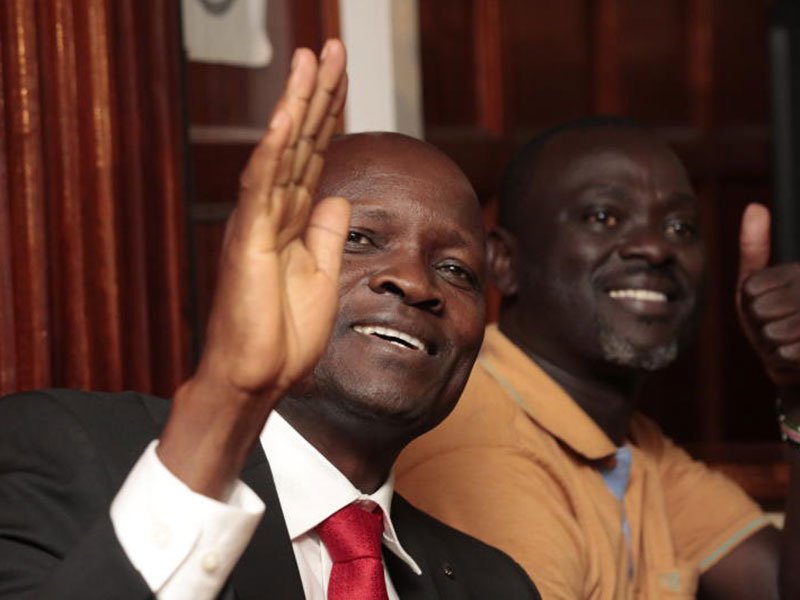CAPTION: Caroline Armstrong-Ogwapit is the Housing Finance thief unmasked today exclusively on this website.
As an investor in HF Group, one would be forgiven for having missed the massive growth in Intangible Assets. Even seasoned Analysts had missed it. We then decided to comb through historical accounts all the way back from 2012 and we began to see a massive change. Below please find the progressive increase in software costs. Hardware costs are not included since they have not been reported separately but are estimated through sources within the bank.
Intangible Assets
31.12.2012 – Net Book Value was Kes 9.9m
31.12.2013 – Net Book Value was Kes 395m, an increase of Kes 386m
31.12.14- Net Book Value was Kes 521m, an increase of Kes 125m
31.12.15 – Net Book value was Kes 819m, an increase of Kes 300m
31.12.16 – Net Book Value was kes 1.2 Billion, an increase of Kes 393m
Overall additions were Kes 1.2Billion
The Beginning
In March 2012, HF came up with a 5 year IT Transformation Map with PriceWaterhouseCoopers as the lead consultant. The Core Banking System (CBS) was to have been rolled out by 2014 and the Vendor was Intrasoft International, a Greek Company.(www.intrasoft-intl.
Immediately they were concerns about why such a contract was given to a Greek Company, not exactly the GoTo country for software development. Countries like China and Russia were way ahead of the pack, with countries like India, a better choice if costs are factored in.
Questions were raised by new members of Senior Management, but word went round that this was a project close to Frank Ireri, Sam Waweru (MD and previous Finance Director) and Caroline Armstrong (Director of Strategic Projects). Any criticism of any kind was dealt with swiftly.
CAPTION: The Greek company Intrasoft International CEO Ms. Wambui Mbesa, with The CEO of Intrasoft International, Mr. Alexandros Manos.
It was also telling that as part of the evaluation process, a fully paid trip to Greece was undertaken by Caroline Armstrong and Constantine Barasa (Asst. General Manager and now Group Finance Director).
However, by September in Senior Management meetings it was reported that implementation of the CBS and related systems was progressing slowly and was well behind schedule with few but critical errors yet to be fixed. Roll out of some other strategic activities was also behind schedule.
How the Proposed Expenditure was meant to look “Normal”
On 1st October 2014, a proposed budget of USD 23m over 4 years was presented to the Executive Committee to be presented to the board with the key costs being:-
• Software costs- USD 4.7m
• Implementation costs – USD 6.9m
• Hardware costs – USD 1.5m
• Operations and Maintenance of USD 4.2m
It was suggested that having spent USD 36 M (including the CBS spend of USD 13 M) HF was within the same budget outlined in the first 5 year technology roadmap. In fact, the consultant went on to congratulate themselves by stating that they had been efficient given that they had spent USD 13.1 M on phase 1 and most of phase 2 yet they had budgeted for USD 20m.
How concerns on the capabilities of the vendors were managed
However concerns were still rife and the second trip to Greece to the vendor’s office, Intrasoft was made by Caroline Armstrong. The purpose of the trip to Greece was to confirm the state of the functionality of the system and an overall determination of whether Intrasoft are capable of delivering the project successfully. A Go- Live date of November 2014 was still planned.
The outcome of the trip was that the Vendor has deployed enough resources to address the gaps identified and Management is reasonably optimistic of a Go Live date in November subject to some critical decisions being made on what to go live with i.e. the functionalities that are not critical to Go Live may be slotted for the next Phase.
This footnote was to become a key disclaimer for what was to be a very expensive system that was unable to meet functionalities required.
On 1st October 2014, a presentation to the Executive Committee of the bank was made. This was going to be the beginning of a series of many presentations prepared by PWC for the board to hide the fact that the potential success of the system was low and spending was happening with little control. For example the staff from Greece were staying at the Intercontinental Hotel and flying back to Greece every 2 weeks. Suggestions that they could stay at the cheaper and more convenient Chester House were met with resentment and disbelief from the Greek Staff.
The True Picture is presented to the Board
The timelines as presented showed was as followed:-
Core Banking System – 24 months from 2012-2014
Key Assessments and Phase 1 Enhancements – 1 year from 2015 to 2016
Others – Middleware, ERP and Channels Management – 1.5 years from 2015 to 2017
Despite all this, it was clear to most of the senior management that the system was not going to work and some of the senior management hatched a plan to inform the board of the true position of the system before the presentation at the Nanyuki Retreat. This was arranged by Ben Lanya (General Manager of HR). Ben is a womanising opportunist and was gambling on the fact that Frank would be made to leave.
A discreet meeting was arranged and some members of the Board including the Chairman were present. They were then informed in graphic detail that the presentation the next day was designed to fool the board. However, unknown to the staff, another meeting led by Caroline Armstrong had already taken place and they had managed to get the Chairman on their side.
The next day, the Chairman was to proceed to lash out at some of the Management for not exhibiting a team spirit. From that day, the Chairman succeeded in ensuring that no staff member would inform the board of any wrong doings that were taking place because of fear of reprisals.
Ben Lanya was now exposed and he had to adopt. He quickly switched sides.
Postponement of the Go-Live
Eventually the Go-live date was postponed to 31st March 2015. Later on the Go-live date was postponed again to 1st June 2015.As a result of this, a full board meeting with the Consultants was held on 7th May to determine, what actions to take in light of the numerous delays in the project. By this time, all opposition to the project had been firmly dealt with and Frank, Sam and Caroline knew that they had a clear path to convince the board that delays were unforeseen with no one at fault.
However, It was generally accepted by most staff that the User Acceptance Tests were failing. UATs, as they are known, are tests carried out by the staff to ensure that any system being tested conforms to their requirements It was, therefore, a surprise to all staff when Frank Ireri announced to all that the closure of the third User Acceptance Testing cycle (UAT 3) and the start of the fourth and final User Acceptance Testing cycle (UAT 4) that will run until October 2015.
At a meeting with stakeholders, Frank was heard stating that they had to launch the system whether it works or not as the Board would not accept otherwise.
For any serious criticism of the project to be taken seriously, it would have to come from a credible IT person. Jacob Musalu Wambua, Manager Systems was one such person. An expert in the Equinox system, his criticism would have been hard to ignore. Therefore a plan was hatched to fire him. Jacob frequently overdrew his personal account but was generally considered honest. This was not unusual in HF and was largely ignored by HR led by Ben Lanya.
At one time, a customer sent an Mpesa SMS providing proof that he had received a kick back and his excuse – he had lent the customer money and he was paying it back.
Why then were Frank Ireri and Sam Waweru so keen on going forward with a flawed system?
The answer would be found in an announcement later that month when announcing the dress rehearsals for the system.
“During the first two weeks, until the final weekend, the data migration team comprised of HF, PWC, KPMG and Intrasoft (the system vendor) experts will be carrying out static and financial data migration from Equinox to the new system. This is data that includes customer names and addresses and also account and account details e.g. interest rates.
Static and financial details will be extracted directly from Equinox to create migration data which will then be passed on to the new systems (PROFITS, SAP modules, and BTS Vision).”
Nothing unusual about this one would think.
However, embedded in this transactions were numerous suspense accounts of transactions which were suspicious in nature. They included loan write-offs for Board Members including the Chairman, Loan write-offs for “Friends of HF”, Claims for Foreign Holidays expenses for Frank Ireri and Sam Waweru, and other large and unusual expenses.
In addition, during the last week of the system change, transactions were not being recorded on the system. With no audit trail, accounts could be adjusted and nobody would be the wiser except for suspense accounts that could not balance. To hide this further, entries to write off these transactions were sent the branches to be posted where they could be embedded with other transactions.
Then there were Non-performing loans. When loans have not been paid on time, bank systems begin counting the days they are past due. Hence a loan that is 30 days past due, means a loan that has not been paid in 30 days. Now the changeover would mean that every loan that was past due would be reset to zero days past due meaning that a loan that was 180 days past due would now read zero days past due.
One would ask, how then would they continue to carry out this ruse once the new system came online since the tally of days past due would start again?
The answer was in the internal cartel of Edmund Muchemi (Chief Finance Officer), Sam Waweru (MD of HFC Bank), Joseph Ngare (Head of Internal Audit) and Caroline Armstrong (Director, Strategic Projects and also a Board Member of Kenya Airways) and Constantine Barasa (Group Finance Director).
It was agreed that this module that would generate the “past due report” would be disabled and Central Bank would be informed that the system was still “under development”.
Edmund would then continue submitting Excel reports to Sam and Constantine which they manipulated on a day to day basis.
Also, the lack of reports provided a valuable opportunity to cover up transactions under HFC Ltd., Housing Finance Development, and Investment (HFDI). HFDI, the real estate arm of HF Group and the developer of Komarock was involved in numerous transactions with a certain contractor, CM Construction. CM Construction has a contract in their favor. CM would borrow huge unsecured facilities from HFC Bank and HFDI would pay the interest. Therefore HFDI would essentially be financing CM Construction yet it was the developer!
One would then ask how would the certificates be paid? The Architect for this and numerous other projects is a relative of Peter Munga. All he did was simply inflate the certificates and this would promptly be paid by HFDI using facilities with HFC Ltd. The funds would then be shared out between the powers that be.
Caption: Equity Chairman Peter Munga whose name never misses in any Bank Saga. Karma recently got the better of him, after his only son committed suicide by jumping out of the balcony of Black Diamond Club in Westlands, plunging to his death. He has failed to connect the death of his son to his greed and habit of exploiting the poor, continued with his looting as if he wants to spread the curse to his other children and grandchildren.
A simple lifestyle audit of the MD of HFDI, James Karanja reveals a super wealthy individual who has worked in HF most of his working life. To camouflage the source of his funds for his huge house in Runda constructed by…..you guessed it-CM Construction, James applied for a Kes 40m loan but has only drawn Kes 19m yet the house is complete.
In addition to this, a company associated with Frank and James was the main supplier of hardware material which was of course supplied at inflated costs.
CAPTION: James Karanja, the understudy of the habitual thief and serial plunderer of Housing Finance Group Frank Ireri.
The impact of all these – the Komarock houses had to be sold at above market prices. The contractor, also cut costs to keep his huge margins resulting in overpriced flats whose sale has been slow resulting in a drop profits for the group.
The lack of reports ensured that there was no audit trail for these intricate transactions.
To reduce oversight on all this, it was imperative that the IT department, Compliance, Credit and Sales were weakened. The Head of IT with over 30 years experience, George Mutua was demoted to operations and the Head of property inspections – Julius Muigai who previously reported to credit now reported to Sam Waweru. Julius Muigai was hired straight from University but within a year, Julius, now obese, had already purchased a flat in Kikuyu and a BMW car. His involvement in giving shoddy construction projects a clean bill of health was well documented resulting in the collapse of building soon after he had cleared it.
As of now, a new Head of IT, Njuguna has since been hired.
Head of Collections a position that did not exist was given to Geoffrey Mwaura, Frank’s relative and a confidant of both Frank and Sam. He was previously in credit but numerous complaints arose as he only approved credits where he had received kickbacks. In fact, he has been instrumental in the approval of most frauds with the biggest, Capital Reality, a Kes 500m loan that went bad years ago but was covered up by the manipulation of credit reports, as numerous kickbacks had been given.
Next step was to appoint Jamleck Chomba, a loyalist involved in the manipulation of the new system to Head of Credit Operations, a job he knew nothing about yet they were other more qualified candidates. His input in the manipulation of the old and new system was critical and when the corruption scandal was reported by the Standard, was instrumental in fudging the report to the auditors.
The Director of Credit, Kevin Isika was now the next target and Ben Lanya began walking round to staff asking for any dirt on him. This was not difficult because he was considered an outsider hence not popular with the old staff involved in the corruption. He would later be fired a few months after he had questioned the lack of reports.
Next was to fire any salesperson affiliated with the previous Head of Business Operations, Timothy Gitonga. In fact, Sam went around bragging that he had a bullet for each one of Timothy’s staff. Numerous staff began to be fired for flimsy reasons.
The Bank had hired Michael Kwerie as the Head of Compliance. However, at the last minute Kennedy Gachoki, the head of the Central Bank Inspection team was hired. Kennedy had been instrumental in providing the bank a clean bill of health despite the numerous concerns while carrying out inspections on behalf of Central Bank
All this was engineered by Sam Waweru and Ben Lanya now partners in crime. In fact, Ben Lanya’s ego had become so big, that he would sexually harass any female employee he fancies, whether married or not.
In fact some had circulated his explicit short cell phone messages and one brave lady proceeded to circulate a recording of his demands for a “hotel jaunt”. Any defiance would be met with victimisation and the sack.
True to their word, after the new system was launched in January 2016, there were no reports that could be produced by the system including numerous critical End of Day reports. Therefore, Finance department has a clear window where they began to manipulate numerous accounts.
All this was known by KPMG who were the auditors on site and cleared the path for them.
CAPTION: Any successful corporate heist needs the able intervention of audit firms and PWC is one of the most notorious in aiding and abetting corporate fraud in the country.
To date the system is prone to errors, numerous downtime and the source of customer dissatisfaction. However, the lack of independent reports is the key “benefit” allowing manipulation of any aspect of the group.
Another interesting titbit is that because of the numerous delays, most of the hardware purchased is now obsolete and HF will soon be on another spending spree.






















































